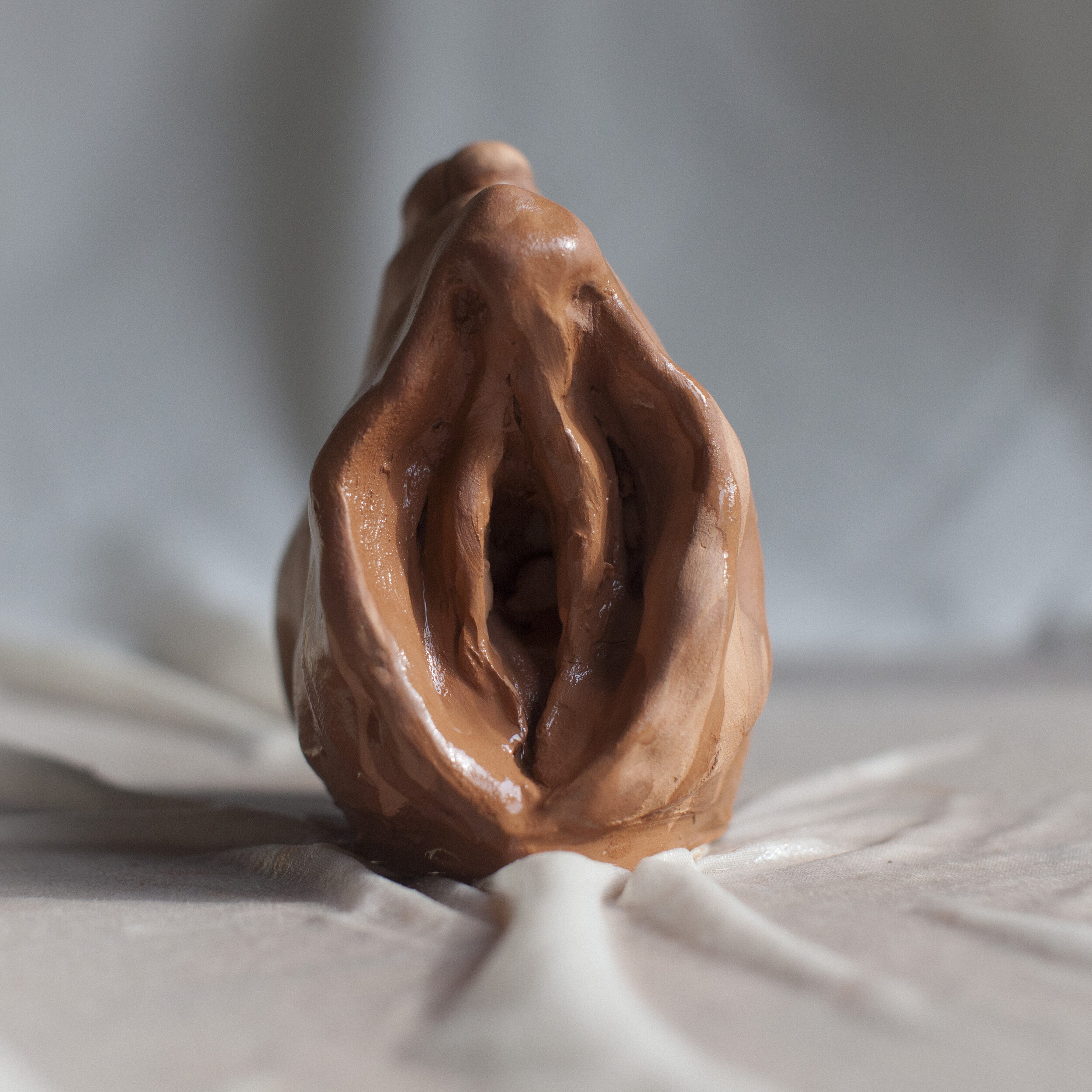Baubo, the vulvanic Goddess
laughter is the best medicine
by Suzanne Schreve
‘Baubo’ by Suzanne (front)
I show it to my husband. He hesitates. ‘Yes, yes, well done’. I turn it around. ‘Hmmm, delicate. Great curves’. I ask him if he has a preference. Without hesitation, definitely the last one. “The other side, the first side you showed me…..I find it scary, cavelike, as if it could suck me right in’.
He shivers. I chuckle.
The sculpture is my ode to Baubo, an ancient Greek Goddess also known as the Goddess of Obscenity. Due to the secrecy and oral tradition of the Eleusinian mysteries, most of her legend remains hidden, probably buried under the rubbles of long forgotten temples. I had the pleasure of meeting her through the story of Demeter and Persephone.
A classic mother and daughter tale, the Demeter & Persephone myth tells about the transformative journey both must undertake to reunite rooted in a renewed independence. While Persephone spends her first months in the Underworld with Hades, who seized her from below, Demeter desperately looks for her daughter above. She wanders the once fertile lands now as dead as her own desire for life, and brings herself onto the brink of silent madness. She finally slumps down against the well of a small town. There, when not much more can be lost, Baubo appears. Seductively shaking her big birthing hips and wriggling her pointy breasts at Demeter, Baubo taunts her into movement. This curious little woman who has no head, but nipples for eyes and her vulva as her mouth, starts to spew dirty jokes and for the first time, Demeter smiles. She smiles, she laughs and soon both of them are in deep belly roars. The laughter lifts Demeter out of her depression and gives her new energy to pick up her search for Persephone again, which in the end, proves to be successful.
‘Baubo’ by Suzanne (back)
As I moulded the spiralling curves into the vulva sculpture’s softer side, allowing the clay to direct my hands, the image of these two parts of the story emerged. Where Baubo leads to (re)union.
She is a dancing comedienne, a shaman whose lascivious unbridled humour magically replenishes. She comes to relieve the emotional tension that imprisons us. While looking for Persephone, Demeter falls into the abyss of depression. Depressions can be a paralyzing confrontation with our own darkness and often bear a hidden intention to unearth unconscious content for the purpose of integration. Her encounter with Baubo suggests that while carrying the loss of her daughter, for Demeter to renew her search, she needs to release the belief systems that in its current state leave her near lifeless, and her search fruitless. Those belief systems kept both her and her daughter from evolving in the first place and prompted Persephone’s abduction.
Like most of us, I grew up in a patriarchal society rife with rules of conduct inheriting skills that suppressed rather than channeled my sexual, creative energy. Holding on to outdated belief systems and habits that did not feed my growth, but instead, depleted it, eventually ran me dry. It killed my creativity.
Greek statue of Baubo
Although I recognized the pattern laid down before me by many generations of women and men, I could not find my way through. Angry, depressed, unmotivated, and eventually, slumped down by the well.
I still remember that first magic moment when I felt frustration and anger willingly move into a free flow of pleasure. Just like with Demeter, it started slowly. A flickering of a smile, a hint of joy. It was out of my control, a natural process which up until then I had denied myself. It didn’t need any outside encouragement. I allowed Baubo to show me the absurdity of my situation. She was making fun of me and it lifted my burden.
Watching videos of Iranian nurses dressed in antiviral suits defiantly breaking out in colloquial dance moves during the current Coronavirus outbreak reminds me of how Baubo’s great gift breathes air into otherwise tense situations. It also bears resemblance of a story Clarissa Pinkola Estes’ wrote in her book “Women Who Run with the Wolves’. The story takes place when General Eisenhower visited Rwanda at the time of the Second World War. The local governor envisioned a warm welcome, with all the beautiful native women lining both sides of the street of the parade. The only problem was that besides jewelry and at most a thong belt, they didn’t wear any clothes. The governor sent skirts and blouses for the women to wear at the event, and as instructed, the women dutifully showed up. But the governor, absolutely abhorred, heard that the women wore the skirts and nothing else. They had left the blouses at home, because they didn’t like the look. The governor angrily summoned the headman who in turn spoke to the headwoman. She ensured him that as the General would drive by, the women planned to cover their breasts.
As the moment quickly encroached, not much else was to be done and the proceedings went ahead. We can only imagine General Eisenhower’s reaction as his jeep rolled on by and woman after bare-breasted woman gracefully lifted up her skirt to cover her chest and, I assume, raucous smile.
Closer to home, many are the times I have stood in front of my five-year-old, exhausted and needing her to go to bed, when she would wriggle her bare bum at me and I could feel the pent up anger inside make way for laughter. Or when I needlessly argue with my husband and one instant of recognition can turn the tide. It is my own exhaustion with the overbearing mum or old judge in me that allows a precious moment of suspension for Baubo to come in and jiggle her titties at me.
The shackles of our collective past weigh heavy, but the playful crudeness of Baubo’s appearance can melt the rigid sincerity with which we carry this load.
What surprised me most is the effort I had put in to ignore her. It seems to me she is often nearby, waiting for me to notice her. I now recognize Baubo’s presence as a moment of choice, as my need to change everyday situations as well as reignite my inherent longing to stay in relation with myself and others. In her luscious Baubo style, she comes to ridicule our perceived stress of lives lived too far away from a more natural state of being.
In these times where most of our society functions far removed from the Earth’s and our own natural rhythms, and more people suffer from its inevitable consequences, Baubo comes as a welcome symbol of transformation. Where conventional notions of established belief systems, social mores and aesthetics are shocked and laughed into dissolution by the crude life-giving, elemental dance of Baubo.
vulvanism:
‘Every truly Radical Elemental Feminist Act of Courage, or any other Volcanic Virtue – no matter how small it may appear to the individual woman who is performing it – is Momentous and contagious. Its effect is enormous. It helps to create the vast morphogenetic field out of which true Metamorphosis can emerge’
by Mary Daly (1998) in “Quintessence…realizing the Archaic Future, a Radical Elemental Feminist Manifesto”.







